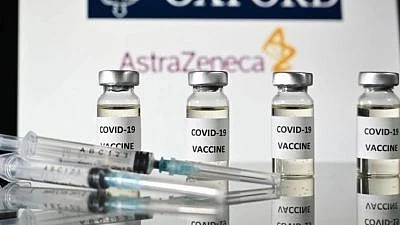A study published in The Lancet has said that as many as seven COVID-19 vaccines give rise to a strong immune response when administered as a booster shot after a complete dose of Oxford-AstraZeneca or Pfizer-BioNTech vaccines, The Indian Express reported.
This comes amid the the Serum Institute of India (SII) seeking approval from the Drugs Controller General of India (DCGI) for booster shots of Covishield (Oxford-AstraZeneca).
With a call yet to be taken on booster doses in India, what do we know about the study? Is there another view? Here's a primer.
What was the study done by Lancet?
In the UK trial, which is the basis of the study, the third booster dose of vaccines such as AstraZeneca, Pfizer, Novavax, Janssen, Moderna, Valneva, or Curevac was given to the patients after 10-11 weeks of the second dose.
The trial examined the safety, the stimulate immune response, and side-effects of the vaccines.
Meanwhile, trial lead and Director of the NIHR Clinical Research Facility, Professor Saul Faust has stated:
“It’s important to note that these results relate only to these vaccines as boosters to the two primary vaccinations, and to the immune response they drive at 28 day.”Professor Saul Faust, as per The Indian Express
Faust added, “Further work will generate data at three months and one year after people have received their boosters, which will provide insights into their impact on long-term protection and immunological memory.”
What did the study conclude?
In case of AstraZeneca, antibody levels rose 1.8 times to 32.3 times depending on the booster used, reported The Indian Express.
In case of Pfizer, the antibodies rose 1.3 times to 11.5 times.
How many people took part in the study?
The trial included 2,878 participants – recruited across 18 United Kingdom sites between 1 and 30 June.
What are some side effects to the vaccine?
According to The Lancet study, the only significant side effect after third dose were – acceptable levels of inflammatory side effects like injection site pain, muscle soreness, and fatigue.
If I have taken two doses of Covishield, should I take a third dose of Covishield?
There is no clarity on this yet.
In their application to the Drugs Control General of India, SII argued that Covishield vaccine should be allowed as a third booster dose as its international counterpart AstraZeneca has already been approved by the UK Medicines and Healthcare products Regulatory Agency in September, reported PTI.
Dr Shahid Jameel, a leading virologist and fellow, OCIS at Green Templeton College at Oxford University told FIT:
"Covishield is not a vaccine that you can use as a booster. If I have had two doses of Covishield, and I get a third dose of Covishield as a booster, it's not going to do very much to enhance my COVID immunity. And that's simply the way the vaccine is, the way the platform is. So for that we will have to deploy other vaccines. India should look at importing RNA vaccines for healthcare workers."
While the Lancet study has found the AstraZeneca vaccine to be a safe and effective booster dose, the research too has its limitations.
For one, the gap between the first two doses and the booster varied in some participants. Also, an age cut off of 30 and above adds to the limitation of the data, as per FIT.
Moreover, the number of people who received primary vaccine dosage of AstraZeneca and were boosted by AstraZeneca was only a small number.
What is India's stand on booster shots?
A National Technical Advisory Group on Immunisation (NTAGI) member told The Times of India that a policy on booster dose is likely to be announced by the end of this month. A meeting has been scheduled in two weeks to decide the same, said a member on 20 November to the newspaper.
Union Health Minister Mansukh Mandaviya said that a decision on booster dose would be taken based on the expert recommendation only, adding that the priority is to complete the adult vaccination programme with both doses at the earliest.
The government has not said anything officially on booster shots yet.
What are the experts saying?
Talking to IANS, Dr Samiran Panda, Head, Epidemiology and Infectious diseases division at the Indian Council of Medical Research (ICMR), said that COVID booster dose may be introduced based on the scientific evidence, but this time our focus should be oriented on total vaccination with both doses across the nation.
Dr Ashok Seth, Chairman Pan Fortis Medical Council, said:
"We should not follow the US in administering the booster dose. Instead, we need to focus on second dose of vaccination which have been left behind. Once we will start administering booster dose, our mass vaccination program may be hampered which we can't bear."
However, Dr Ashutosh Shukla, Senior Director, Internal Medicine & Medical Advisor, Max Hospital, told IANS that the priority for India should be to ensure both doses of vaccination for the entire country this time.
"We have to wait for more research data on this as to when to administer the booster dose. The efficacy for the current vaccine falls between 70 and 80 per cent after 6 months of administration. So, whether the third shot should be given after 6 or 9 months or even after a year will be determined by the further research which is yet to come."
